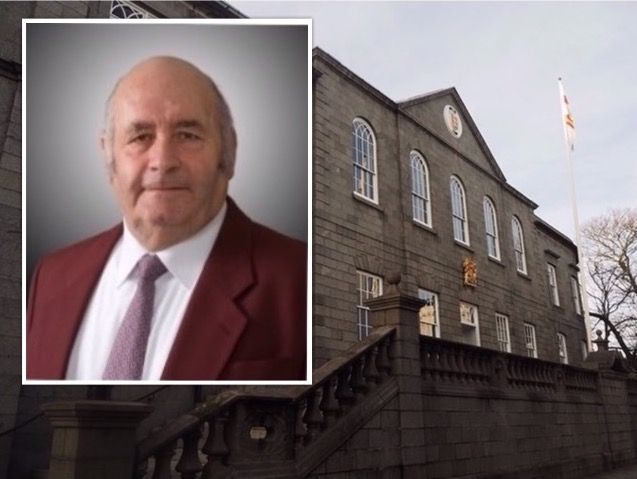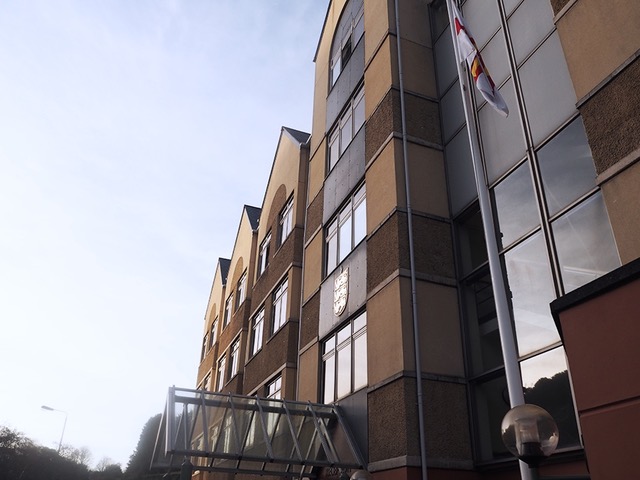

With some fresh calls for an executive style of government to be brought in, former politician Graham Guille considers what this might mean for the States of Guernsey.
As a Deputy both before and after the changes made to the machinery of government during 2004, Mr Guille also has experience on a parochial level:

Pictured: Many of Guernsey's political plans are made at Sir Charles Frossard House.
Many of you will have seen repeated calls being made in the media from members of the business community and others for the Island to abandon the present 'Consensus' system of government and move to an 'Executive' or 'Cabinet' model such as they have in the UK Parliament. We are told endlessly that Consensus politics is slow, indecisive and anti-business while Executive government is portrayed as slick, efficient and business like. If this is true would it not benefit the Island to change the system?
Before making such a change I suggest anyone tempted to do so might like to review how the government we now have has evolved since the Second World War and what the consequences of making such a change might have for democracy in Guernsey. Surely what is important is not how well any government performs but WHO it performs well for.
Shortly after the Second World War it was resolved that to get the Island’s government back on an even keel the Bailiwick would need some steady, experienced hands on the tiller. It was decided, with some UK help that the Islands parliament would include appointed members (who the States decided would be called Conseiller) they would be selected by an electoral college of the Assembly but importantly without reference to the voting public.
While this ran counter to accepted notions of democracy it was apparently felt that it could be justified in the short term to provide the necessary stability while the Bailiwick got back on its feet.
This ‘stop gap’ arrangement was only intended to stay in being for a few months, perhaps a few years at most. For a number of reasons it was to last, with a few limited modifications, until the late 1980’s.
In the interim the Island was to all intent and purposes run by the ‘rich and powerful’ for the ‘rich and powerful’. For years the situation was justified by the claim that any economic prosperity that resulted would ‘trickle down’ into the wider economy through taxation and employment opportunities and all would therefore benefit.
However, in the intervening years the divide between the ‘have’s’ and ‘have not’s’ in Guernsey’s society has widened relentlessly and if there ever was any economic ‘trickle down’, those lower down the ‘social ladder’ saw very little of it.
Growing calls from the voting public for a more accountable government resulted in the first ever ‘all - Island’ elections for the Offices of Conseiller and Deputies which were held in the early 1990’s. These elections saw candidates being elected to all the seats in the island’s parliament with those filling the office of Conseiller invariably becoming heads of the various branches of government.
The previous ‘ruling elite’ however, seeing that many of their number failed to get elected contrived to get the office of Conseiller abolished and the government was from then on, comprised of a single tier (all Deputy) Assembly.
Those who had previously held the reins of power in Guernsey however have never stopped trying to get that power back. Repeated attempts have been made in the years since to undermine the ‘consensus’ model of government by seeking at every turn to show that form of government is incapable of delivering effective leadership and governance.
While all this has been going on there has been a small but growing ‘left’ leaning group slowly building within the Assembly. While this would normally be a positive trend they have of late begun to work hand in glove with the ‘right’ to eliminate those holding the middle ground in local politics.
The last election saw the departure of many ‘middle of the road’ candidates who, having seen what was going on, decided to stand down rather than face near continuous attack from both sides.
Having for the most part crushed those holding the ‘centre’ ground, the fight now going on is between the ‘left’ (some of whom hold a fairly extreme environmental outlook) and business oriented ‘right’ (who are now forming into political groups).
The worrying thing is this: neither appears prepared to share power with anyone.
This is especially concerning as in a single chamber parliament the result of either group gaining power, will inevitably result in the Island becoming effectively an elected dictatorship. For Westminster ‘executive’ or ‘cabinet’ style political structures to work without the above happening, there are normally three additional safeguards built in from the outset.
At the moment in the Bailiwick we are short of almost all of the elements normally considered necessary to protect the electorate’s rights and interests, which I suspect is why so many are trying very hard to see an executive government introduced in Guernsey.
Pictured top: Graham Guille.
Comments
Comments on this story express the views of the commentator only, not Bailiwick Publishing. We are unable to guarantee the accuracy of any of those comments.